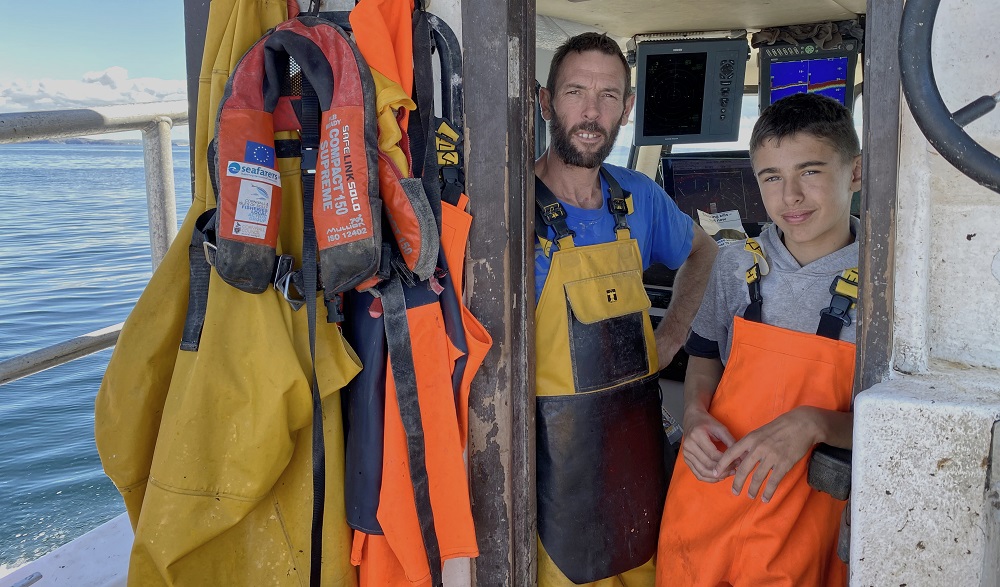OU News
News from The Open University
- Home
- TV cameras return to Cornwall to explore its fishing life
TV cameras return to Cornwall to explore its fishing life
Posted on • TV and radio

The beauty of Cornwall and the fishing tales of generations of fishermen are captured in a brand new six-part BBC/OU co-produced series this month.
Cornwall: This Fishing Life is back for a new series where the past 12 months have seen the impact of two hugely challenging issues for this far flung county: Brexit and Covid-19.
For generations, fishermen of Cornwall have worked some of the world’s richest fishing grounds. As Britain prepares to go it alone and leaves the EU, the series looks at what the future holds for this fishing life.
The series, which starts on BBC Two at 9pm on Monday 18th January, follows Cornish fishermen as they fight to secure a future for their traditional way of life at a time of enormous change and amid a pandemic.
Episode One visits Newquay, where we find fishermen catching up on the lost time after lockdown. Livelihoods are on the line and the Cornish fleets are steaming into a summer, the likes of which they have never known before. In future episodes the action focuses on issues and life in Looe and Padstow, among others.

Academic consultant to the series is Dr Vicky Johnson, staff tutor in Geography in the Faculty of Arts and Social Sciences. She said:
“This second series has a real link to the impact of Covid-19 on Cornwall. The county has always been seen as a unique environment in the UK with Covid, this remoteness became an issue in itself.

“For example, in the first episode we see how local fishing businesses have had to find new markets for fishing – a crab fisherman pulls his family in, adapting to change to serve a population in lockdown, and being successful.
“Also we see how Cornwall saw an explosion of visitors on so-called Super Saturday – 4th July – when tourists flocked to its beaches and restaurants, including pop-up ones. Once the first lockdown restrictions of 2020 came to an end it brought both pros and cons for the people of Cornwall.
To support This Fishing Life OpenLearn content has been developed, both by Dr Johnson as well as further related material by her fellow OU colleagues.
“Linking the series back to our modules and qualifications is also really important, in this series the connection with our new BA (Honours) Geography qualification has been lovely to establish.“
Explaining the impact of Brexit on Cornwall, she added:
“With Brexit there’s been heightened interest in what will happen as a result, on the environment and the people themselves. Whilst the changes resulting from Britain’s exit from the EU will be staged over the next five-years, there will be many changes to deal with and it is a complex picture.
“Delays in the spider crab market for example or ironing out the specifics over the clear ownership of fishing vessels are just two of the many issues that will occupy the time and effort of local business people.
Colourful and engaging picture
“Above all it will give a colourful and engaging picture of how an English holiday location came to life again amid Covid in 2020 and what the future will hold as a result.“
Dr Johnson’s research began in her early career looking at water quality and the environment and latterly she has studied the challenges for rural communities and their management of health, transport and affordable housing.
This series was commissioned by Broadcast and Partnerships and is supported by the Faculty of Arts and Social Sciences with particular relevance to:
Q99 Environmental Studies
QD Open Degree
U116 Environment: Journeys through a changing world
DD103 Investigating the social world
DST206 Environment: Sharing a Dynamic Planet
DD213 Environment and society
SDT306 Environment: Responding to Change
DD319 Environment Policy in an International Context.
Cornwall: This Fishing Life is a BBC/OU Co-production, produced by Frank Films Television Ltd.
- Commissioned by: Dr Caroline Ogilvie, Head of Broadcast & Partnerships
- Academic Consultants: Dr Vicky Johnson
- Media Fellow: Dr Alison Penn
- Broadcast Project Manager: Jo Weeks
- Digital Content Producer: Daniel Browne
Executive Producer – Steve Robinson, Jamie Balment
Producer – Jess Howe
Series Producer Luke Pavey
Director – Fred Windsor-Clive
Online:
Dr Vicky Johnson has also produced content for the Open Learn broadcast page to support this series. Visit OpenLearn to find out more about the fish you eat, and the journey it’s been on to make it to your plate